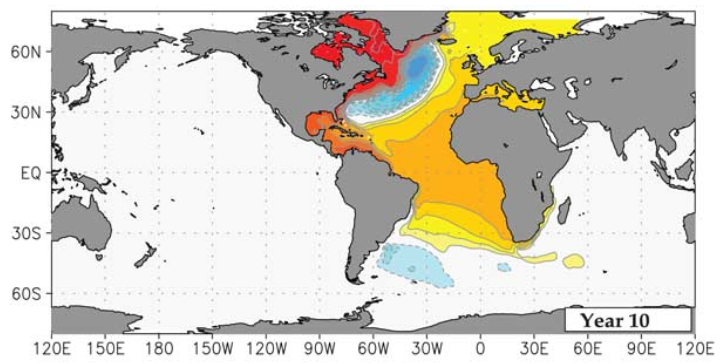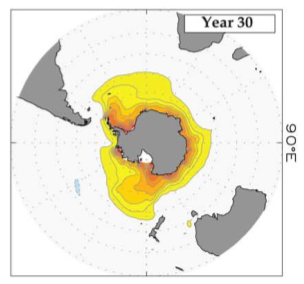Melting Icecaps and the Global Ocean (Updated)

We're doooooomed, doooo-- wait a minute.
If the Greenland icecap sees an even-more-significant melt, how soon do you need to pack your bags and head for the high country? Unless you live along the Atlantic coastlines of North America or Europe, you'll have a few decades, at least. And if the Antarctic icecap melts, we'll have even longer -- at least 50 years, probably much more. These are the surprising results of research undertaken by Detlef Stammer of the University of Hamburg, Germany, written up in "Response of the global ocean to Greenland and Antarctic ice melting," published in the Journal of Geophysical Research. New Scientist summarizes his findings thusly:
... the majority of Greenland's meltwater will stay in the Atlantic Ocean for at least 50 years, causing sea levels here to rise faster than expected. "The Greenland ice cap is much less of a threat to tropical islands in the Pacific than it is for the coasts of North America and Europe," he says. [...] Antarctic meltwater could be prevented from reaching much of the world for centuries due to strong currents in the Southern Ocean, says Stammer.
Stammer's work covered a 50-year time horizon, mapping the progress of freshwater runoff through "boundary waves, equatorial Kelvin waves, and westward propagating Rossby waves." Stammer describes the volume of melting ice in his model as reflecting "enhanced runoff," although it appears from the piece that this ends up being a fairly conservative take on how rapidly the ice could melt. It does not appear from the model structure that increased meltwater volume would affect the overall global ocean current flows; however, the argument Stammer makes in the article (under-emphasized in the New Scientist summary) is that the cold freshwater flux would have a significant effect on salinity and surface temperature. The salinity and temperature changes, in particular, could have a measurable impact on the warm water flows keeping Europe warm, so once again we're back talking about localized "whiplash ice ages" (Stammer does not suggest this, but it follows).
An even more important element (getting less play in the article, unfortunately) is the lack of significant sea-level increase in the global ocean in the first few decades of an enhanced Antarctic melt. Since the potential overall sea-level increase from Antarctic ice dwarfs the potential from Greenland, this is an important finding.

One question that leaps out for me: if you have a cold freshwater flux cutting down on mixing and surface temperature, what does that do to ocean thermal inertia? My sense is that a flux of colder surface water, aside from all of the havoc it would wreak on ocean ecosystems, might actually slow the pace of overall global warming. I'd welcome more educated analysis on this.
Stammer's work matches earlier, less complex, analysis, so there's a good chance it maps to reality. Even if the runoff flow is significantly greater than used in this model, we'll still see a slow wave of sea level increase, not reaching the Pacific and the Indian oceans for decades. In that sense, any delay of disastrous results is to be welcomed, since delays mean more time to figure out and implement mitigation and adaptation strategies.
There's an important element of politics in this, too. The first places to be hit by Greenland icecap runoff-induced sea level increases would be the east coast of North America and (somewhat later) the west coast of Europe; the low-lying developing nations of the Pacific and Indian Ocean regions wouldn't be affected for decades. In fact, looking at the sea-level increase maps in the article, it looks like the North American east coast gets hammered pretty hard fairly quickly. I have no desire for my friends along the Atlantic coast to suffer, of course, but a direct threat to New York, DC, London and the like is more apt to bring a rapid response than would a more generalized threat that would hurt Tuvalu or Bangladesh first. Sad, but probably true.
(Thanks to David Zaks for letting me read the article!)






Comments
Hmph. All this "we're not gonna die" talk is just response to accusations of being despair-ridden in the last post's comments, isn't it?
Posted by: Ariana | July 15, 2008 7:37 PM